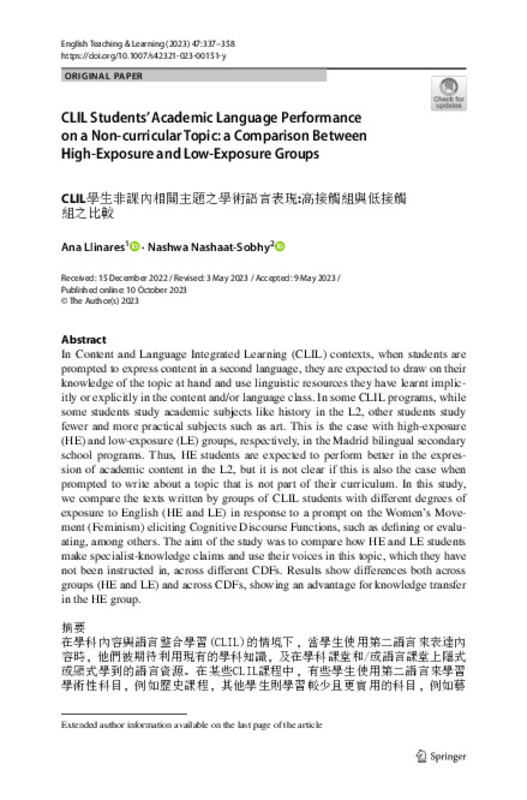JavaScript is disabled for your browser. Some features of this site may not work without it.
Buscar en RiuNet
Listar
Mi cuenta
Estadísticas
Ayuda RiuNet
Admin. UPV
CLIL Students Academic Language Performance on a Non-curricular Topic: a Comparison Between High-Exposure and Low-Exposure Groups
Mostrar el registro sencillo del ítem
Ficheros en el ítem
| dc.contributor.author | Llinares, Ana
|
es_ES |
| dc.contributor.author | Nashaat-Sobhy, Nashwa
|
es_ES |
| dc.date.accessioned | 2024-04-25T18:08:27Z | |
| dc.date.available | 2024-04-25T18:08:27Z | |
| dc.date.issued | 2023-09 | es_ES |
| dc.identifier.issn | 1023-7267 | es_ES |
| dc.identifier.uri | http://hdl.handle.net/10251/203765 | |
| dc.description.abstract | [EN] In Content and Language Integrated Learning (CLIL) contexts, when students are prompted to express content in a second language, they are expected to draw on their knowledge of the topic at hand and use linguistic resources they have learnt implicitly or explicitly in the content and/or language class. In some CLIL programs, while some students study academic subjects like history in the L2, other students study fewer and more practical subjects such as art. This is the case with high-exposure (HE) and low-exposure (LE) groups, respectively, in the Madrid bilingual secondary school programs. Thus, HE students are expected to perform better in the expression of academic content in the L2, but it is not clear if this is also the case when prompted to write about a topic that is not part of their curriculum. In this study, we compare the texts written by groups of CLIL students with different degrees of exposure to English (HE and LE) in response to a prompt on the Women¿s Movement (Feminism) eliciting Cognitive Discourse Functions, such as defining or evaluating, among others. The aim of the study was to compare how HE and LE students make specialist-knowledge claims and use their voices in this topic, which they have not been instructed in, across different CDFs. Results show differences both across groups (HE and LE) and across CDFs, showing an advantage for knowledge transfer in the HE group. | es_ES |
| dc.description.sponsorship | Open Access funding provided thanks to the CRUE-CSIC agreement with Springer Nature. This work was supported by the Ministerio de Ciencia e Innovación (Spain) (Award Number: RTI2018-094961-B-I00). | es_ES |
| dc.language | Inglés | es_ES |
| dc.publisher | Springer | es_ES |
| dc.relation.ispartof | English Teaching & Learning | es_ES |
| dc.rights | Reconocimiento (by) | es_ES |
| dc.subject | Content and language integrated learning | es_ES |
| dc.subject | Legitimation code theory | es_ES |
| dc.subject | Specialisation codes | es_ES |
| dc.subject | Appraisal theory | es_ES |
| dc.subject | Academic lexis | es_ES |
| dc.subject | Cognitive discourse functions | es_ES |
| dc.subject.classification | FILOLOGIA INGLESA | es_ES |
| dc.title | CLIL Students Academic Language Performance on a Non-curricular Topic: a Comparison Between High-Exposure and Low-Exposure Groups | es_ES |
| dc.type | Artículo | es_ES |
| dc.identifier.doi | 10.1007/s42321-023-00151-y | es_ES |
| dc.relation.projectID | info:eu-repo/grantAgreement/AEI/Plan Estatal de Investigación Científica y Técnica y de Innovación 2017-2020/RTI2018-094961-B-I00/ES/ESTUDIO LONGITUDINAL DE CAPACIDADES LINGUISTICAS AVANZADAS EN AICLE: LENGUAJE DE LAS DISCIPLINAS, PRACTICA EN EL AULA Y PERSPECTIVAS DE LOS PARTICIPANTES/ | es_ES |
| dc.rights.accessRights | Abierto | es_ES |
| dc.contributor.affiliation | Universitat Politècnica de València. Escuela Politécnica Superior de Gandia - Escola Politècnica Superior de Gandia | es_ES |
| dc.description.bibliographicCitation | Llinares, A.; Nashaat-Sobhy, N. (2023). CLIL Students Academic Language Performance on a Non-curricular Topic: a Comparison Between High-Exposure and Low-Exposure Groups. English Teaching & Learning. 47(3):337-358. https://doi.org/10.1007/s42321-023-00151-y | es_ES |
| dc.description.accrualMethod | S | es_ES |
| dc.relation.publisherversion | https://doi.org/10.1007/s42321-023-00151-y | es_ES |
| dc.description.upvformatpinicio | 337 | es_ES |
| dc.description.upvformatpfin | 358 | es_ES |
| dc.type.version | info:eu-repo/semantics/publishedVersion | es_ES |
| dc.description.volume | 47 | es_ES |
| dc.description.issue | 3 | es_ES |
| dc.relation.pasarela | S\500996 | es_ES |
| dc.contributor.funder | Ministerio de Economía y Competitividad (RTI2018-094961-B-I00) | es_ES |
| dc.subject.ods | 04.- Garantizar una educación de calidad inclusiva y equitativa, y promover las oportunidades de aprendizaje permanente para todos | es_ES |








